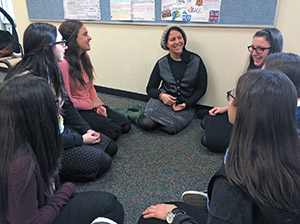
Ma’ayanot’s unique guidance program affords necessary time for bonding and self-reflection. Since its inception nearly 20 years ago, Ma’ayanot has recognized the emotional complexity of the high school years and the necessity of providing students opportunities to reflect on and process life issues in a safe, non-judgmental setting. Built into Ma’ayanot’s educational program, therefore, is the school’s unique Mehanekhet curriculum, a weekly guidance program dedicated to fostering students’ social, emotional, and religious growth.
Ma’ayanot’s Mehanekhet program is an important part of the Ma’ayanot experience throughout all four years of high school. Each year every grade is divided into small groups of 10-15 diverse students, and each group is paired with a female faculty advisor. Mehanekhet groups meet weekly with their advisor to discuss “life topics” in a relaxed, comfortable, and safe environment. In addition to affording students a designated time and space to contemplate sensitive issues in a supportive setting, it also provides an opportunity for students to develop meaningful relationships with faculty members outside of the classroom. Indeed, a key role of the Mehanekhet is to serve as a trusted adult to whom students can turn for support, guidance, advice, or even just a sympathetic ear.
Mrs. Nina Bieler, M.S.W., Head Mehanekhet (and Director of Admissions), is primarily responsible for developing the Mehanekhet curriculum, which is designed to meet the developmental and emotional needs of the students as they progress through high school. As such, certain Mehanekhet topics are grade specific; for example, the 9th grade curriculum includes the topics “Setting Goals for High School” and “Study Skills,” while the 12th grade curriculum includes “Domestic Violence, Dangers of Drunken Driving,” and “Religious Challenges on the College Campus.” Other topics, however, are common across all four grades, including self-esteem, positive body image, navigating friendships, social transitions, stress management, and decision-making, to name a few. While a set curriculum has been established for each year of high school, the program also allows for fluidity and spontaneity to respond to difficult issues as they arise for any given grade in any given year.
Examples of important issues currently being discussed in Mehanekhet across all four grades include Internet safety and cyberbullying. To address these issues, 9th graders will hear from an officer of the Bergen County Police Department, and they will participate in the Internet campaign, “If You Wouldn’t Say It, Don’t Write It”; 10th graders will participate in an improvisation presentation by an acting troupe trained by the Bergen County Division of Family Guidance, and 11th and 12th graders will attend a presentation on Internet safety by Ms. Ellen Amsel, Chief Information Security Officer at Princeton University.
Other issues of critical importance across all grades include the issues of self-esteem and developing a positive self-image, topics that are covered in a variety of ways across the four-year Mehanekhet curriculum. For example, 9th grade students utilize Dove’s Campaign for Real Beauty to initiate discussions on body image and on how the media impacts young women’s self-image. Tenth grade students revisit the issue of societal expectations of beauty, but also spend time discussing the topic of tzniut (modesty), which necessarily entails exploration of the oft-sensitive intersection between religious ideals, societal expectations, and self-expression. The 11th grade curriculum utilizes a “Brag Role” activity to encourage students to know and be able to articulate their personal strengths, an indispensable skill for the college application process. Finally, seniors utilize several sessions to delve into the important issue of valuing oneself within the context of critical relationships, including future romantic relationships.
Along these same lines, a fascinating program brought in once every other year for juniors and seniors, the monologue “Flowers Aren’t Enough” by Naomi Ackerman, specifically targets the difficult issue of domestic violence. While simultaneously entertaining yet difficult to watch, this monologue always makes an impression and leaves the students open to having candid small group discussions about this important topic.
In summing up the goals for Ma’ayanot’s Mehanekhet program, Mrs. Rivka Kahan, Ma’ayanot’s Principal, notes that “the discussions and relationships that are developed through Mehanekhet are intended to contribute to a school culture that is reflective, open, and focused on the growth of the whole student, while the small group format is intended to provide a framework for students to develop their social-emotional awareness and skills as they grow into thoughtful, mature adults and members of society.”









